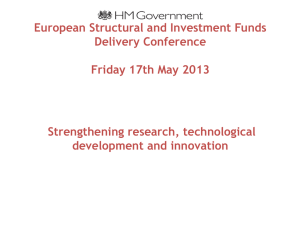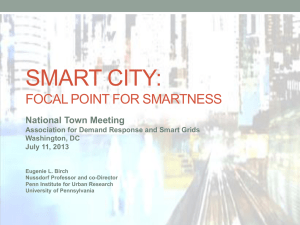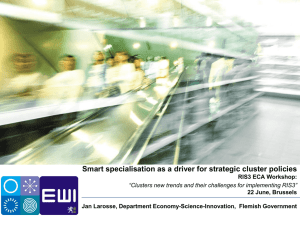Smart specialisation and the “entrepreneurial
advertisement
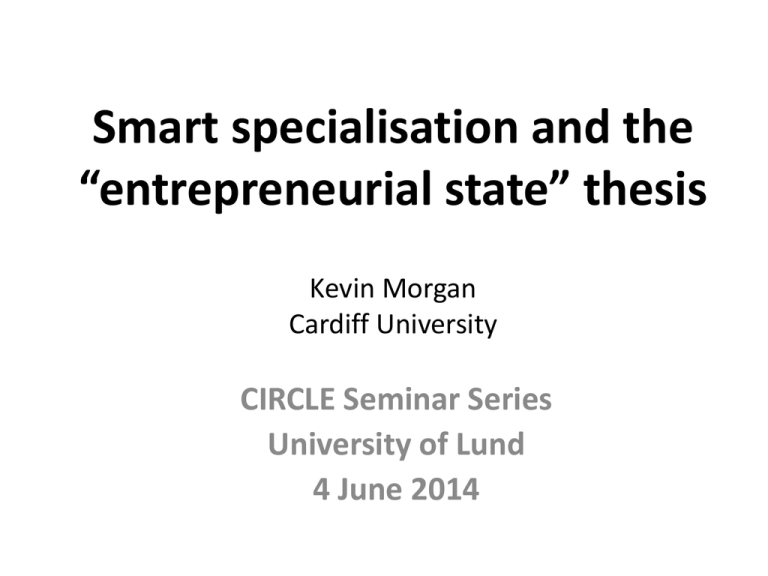
Smart specialisation and the “entrepreneurial state” thesis Kevin Morgan Cardiff University CIRCLE Seminar Series University of Lund 4 June 2014 Overview • Debating the state in innovation – the neo-liberal critique – critiques of the critique • Place-based innovation – territorial/relational conceptions of place – triple challenge of smart specialisation • Regional policy repertoires – state-centric v network-based repertoires Debating the state: the neo-liberal critique • Politically based on a zero-sum conception (less state = more market) • Theoretically based on Hayekian insights: – Industrial policy will induce rent-seeking, so states should not engage in “picking winners” – Informational: the state cannot be a surrogate for the decentralised information processing capacity of markets Debating the state: the “entrepreneurial state” thesis • A recent critique of the neo-liberal critique is The Entrepreneurial State, which aims to: – change the way we talk about the state – claims the state is innovative and risk-taking – shows how the smart technologies of the iPhone (Internet, GPS, touchscreen display, SIRI etc) were all funded by the state • But it uses DARPA to illustrate the thesis (ie. a unique mission-driven US defence agency) • Big problems with mission-driven innovation policy (see Morgan & Sayer) Debating the state: the experimentalist state • A more persuasive critique of the neo-liberal critique is the social learning approach (eg Rodrik; Sabel; Gertler/Wolfe): – the state lacks information, but so does the private sector! – firms and states need to collaborate to learn together in a trial-and-error process of experimentation (the process being more important than the policy) – the aim is to elicit information, find joint solutions, and evaluate outcomes as they emerge (drawing on the “embedded autonomy” thesis of Peter Evans) Place-based innovation • The “relational turn” in geography has enriched our understanding of the constitution of “place” • But it does not help to juxtapose relational and territorial conceptions - places are bounded and porous, shaped by local and trans-local forces • Spatial fetishism can be a problem in territorial conceptions of place - but regional governments act in and for their regions (ie. spaces are not agents but some agents act for their spaces) Smart specialisation • Smart specialisation concept has been heavily influenced by certain theories – – the experimental state thesis (eg Foray draws on Rodrik et al for the self-discovery process) – evolutionary economic geography (eg path dependence and related variety etc) – relational turn (eg the role of trans-local factors and networks) The triple challenge • The challenge of smart specialisation is threefold: • Conceptual challenge – do the core theoretical arguments stack up? • Operational challenge – is the six-step approach feasible for poor state-centric regions? • Political challenge - can the multi-level polity be synchronised for an integrated place-based approach to innovation and development? Regional policy repertoires • Too much variability to speak of “the region” or “the regional state” • In politically constituted regions (where there is a mandated agency to act on behalf of the region) there are contrasting repertoires even in apparently similar regions: – state centric repertoire (Wales) – network-based repertoire (Basque Country) State-centric repertoires • Wales has fashioned a state-centric repertoire for two very different reasons: – by default - because it has a weak indigenous business class and a dependent civil society, so economy and society looks to the state for a lead in a country which is a de facto one-party state – by design - because it abolished its regional development agency (WDA) and absorbed its functions within the state, a move that reduced diversity, pluralism and the capacity for robust feedback (“speaking truth to power”) State-centric repertoires • State-centricity in a one-party state, combined with weak feedback mechanisms, led to very expensive disasters (eg the Technium Centres which cost more than £100 million) • The big question is whether this state-centric system can rise to the S3 challenge, where non-state actors – business and universities have been allotted a major role in the process of entrepreneurial discovery? Network-based repertoires • The Basque Country has a strong state system but the state is pervasive but not invasive (ie it respects subsidiarity) • The BC has a stronger indigenous business community and a much stronger regional innovation system • Intermediate institutions (technology centres and cluster organisations etc) co-design policy with the regional state and enhance diversity Network-based repertoires • But the BC regional innovation system has its own challenges in the S3 era • Designed in an age of plenty, the RIS is now threatened by the age of austerity • Already signs of institutional cannibalism as RIS bodies vie for funds and functions • Other problems include a weak university system and an under-developed M&E system Conclusions • Conceptions of the state need to move beyond the caricatures of right and left • The “entrepreneurial state” is a smart state (not the shrunken state of neo-liberalism) but it is not the public sector norm • Place-based innovation needs to address new models of innovation - like social innovation and sustainability transitions etc • The politics of regional innovation policy is poorly understood...the RIS literature remains very technocratic References • Foray, D. et al (2012) Guide to Research and Innovation Strategies for Smart Specialisation, European Commission • Gertler, M. and Wolfe, D. (2002) (eds) Innovation and Social Learning, Palgrave • Mazzucato, M. (2013) The Entrepreneurial State, Anthem Press • Morgan, K. (2013) The Regional State in the Era of Smart Specialisation, Economiaz, 83(2) • Morgan, K. and Sayer, A. (1988) Microcircuits of Capital, Polity Press • Rodrik, D. (2004) Industrial Policy for the Twenty-First Century, UNIDO • Sabel, C. and S. Reddy (2007) Learning to Learn, Challenge, 50 (5)
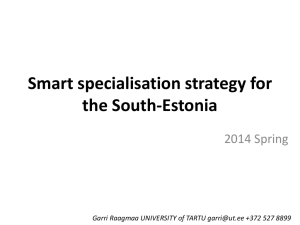

![[I-2] Mahr](http://s2.studylib.net/store/data/005533114_2-575c16bb39129d77e4fc404ccab7077e-300x300.png)



